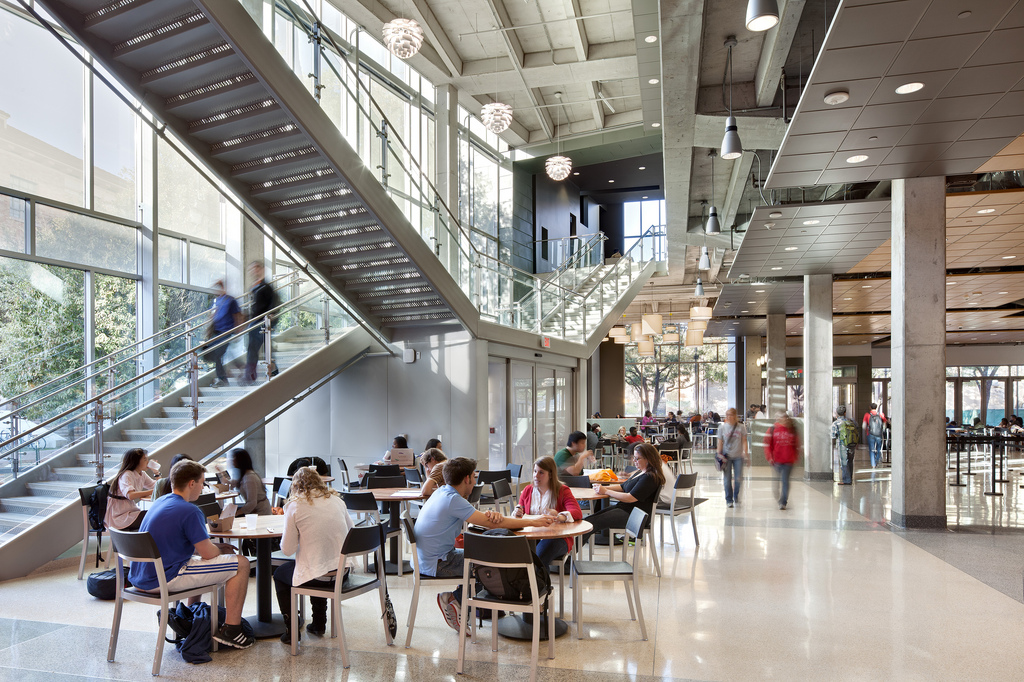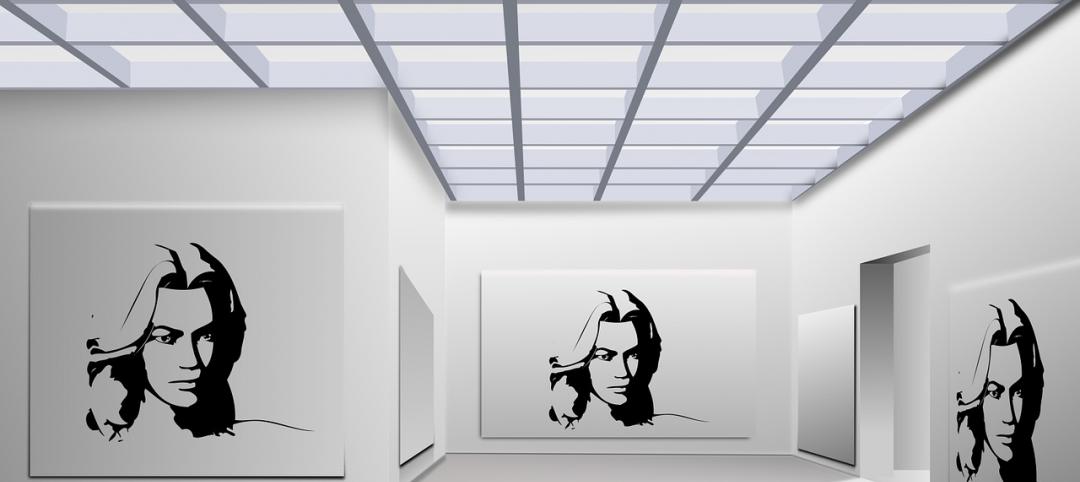AUSTIN, TEXAS, March 22, 2011 – The new Student Activity Center (SAC) at the University of Texas campus in Austin is of the students, by the students, and for the students. The SAC is the result of almost 60 years of student lobbying for another dedicated social and cultural center on campus. Located in the heart of the campus, this 149,000 square foot facility is designed to serve as the “campus living room” – it is a place for students “to see and be seen”. The facility should earn a LEED Gold certification, a first for the campus.
Extensive student input and design workshops generated the main project goals, which were easy accessibility, more activity spaces and overall sustainability. Overland Partners Architects of San Antonio, TX and associate architect WTW Architects of Pittsburgh, PA responded with a contemporary building on the East Mall of campus, the primary pedestrian point of entry to the campus. The new SAC is geographically and functionally complementary to the existing student union on the West Mall, and important in serving the growing student body.
To meet the student goal of dedicated activity spaces, the SAC includes a 5,000 square foot ballroom, a 500-seat auditorium, a black box theatre, 12 student conference/meeting rooms, student organization offices, and a student government chamber. The ballroom is already booked for months with events like comedian Zach Braff, a 3-D Gaming tournament, and a concert by Chuck D. and Common. There are also ample group study lounges and informal individual study areas scattered throughout the facility. An indoor food court featuring regional fast food favorites and a coffee bar sits adjacent to more than 46,000 square feet of landscaped outdoor gathering space, substantially increasing the seating and providing an enjoyable dining experience in the moderate Austin climate.
The new SAC has struck a powerful chord at the university in response to project goals.
“I have to say that a mark of any successful building is how it makes one wonder how we managed without it,” Juan González, Vice-President for Student Affairs, said. “It is truly a major enhancement to not only the area, but the whole campus environment. It is especially rewarding to see so many students embrace the facility from the moment we opened the doors.”
The SAC is a modern take on the traditional campus architecture. The simple forms and clean lines of the SAC distinguish it, yet the limestone walls and red tile roofs unify it with the existing campus buildings. Tucked behind a mature oak grove, abundant windows throughout the building bring in ample daylighting and take advantage of the surrounding landscape. There is an accessible rooftop courtyard with an adjacent green roof, and a cistern that collects and recycles rainwater for landscape irrigation.
Renowned international artist James Turrell is designing a skyspace installation for the SAC opening in fall 2012. The enclosed rooftop space will have an opening in the roof surrounded by LED lights that will affect the viewer’s perception of the sky.
The project has only been open since January, yet students are already using every available inch of space. Early student reviews of the SAC are glowing.
“I went to peak at the new structure, and OH MAN. It’s awesome. Though we have the Union, academic center, and library, UT always lacked a central place where students could take a break between places, grab a bite to eat, nap, cram for a test, or hold student org meetings. The SAC provides all of the above and with style,” according to one UT student blog.
About Overland Partners
Overland Partners Architects, founded in 1987 in San Antonio, Texas, is the realization of a vision to bring together a wide range of talents in architecture and planning in order to provide comprehensive design services. Sensitive to the environmental and aesthetic contexts of its projects, the firm strives for a thoughtful integration of technology, art, and craft through highly sustainable solutions. Overland Partners offers its clients the ultimate goal of creating beautiful, functional and enduring designs through a collaborative process that inspires long-term relationships. In addition to the Student Activity Center at the University of Texas the firm is currently working on the university’s new College of Liberal Arts. The firm completed the Lady Bird Johnson Wildflower Center at the University of Texas in Austin, winner of more than 10 regional and national design awards. Other higher education projects within the firm’s design portfolio include the new Business School Building at Baylor University in Waco, Texas; the new Academic Building at the University of North Texas at Dallas; the new Continuing Education Center at Rice University in Houston; and the School of Architecture and Landscape Architecture at Pennsylvania State University in University Park, Pennsylvania.
Related Stories
Museums | Aug 11, 2010
Design guidelines for museums, archives, and art storage facilities
This column diagnoses the three most common moisture challenges with museums, archives, and art storage facilities and provides design guidance on how to avoid them.
| Aug 11, 2010
Broadway-style theater headed to Kentucky
One of Kentucky's largest performing arts venues should open in 2011—that's when construction is expected to wrap up on Eastern Kentucky University's Business & Technology Center for Performing Arts. The 93,000-sf Broadway-caliber theater will seat 2,000 audience members and have a 60×24-foot stage proscenium and a fly loft.
| Aug 11, 2010
Citizenship building in Texas targets LEED Silver
The Department of Homeland Security's new U.S. Citizenship and Immigration Services facility in Irving, Texas, was designed by 4240 Architecture and developed by JDL Castle Corporation. The focal point of the two-story, 56,000-sf building is the double-height, glass-walled Ceremony Room where new citizens take the oath.
| Aug 11, 2010
Carpenters' union helping build its own headquarters
The New England Regional Council of Carpenters headquarters in Dorchester, Mass., is taking shape within a 1940s industrial building. The Building Team of ADD Inc., RDK Engineers, Suffolk Construction, and the carpenters' Joint Apprenticeship Training Committee, is giving the old facility a modern makeover by converting the existing two-story structure into a three-story, 75,000-sf, LEED-certif...
| Aug 11, 2010
Utah research facility reflects Native American architecture
A $130 million research facility is being built at University of Utah's Salt Lake City campus. The James L. Sorenson Molecular Biotechnology Building—a USTAR Innovation Center—is being designed by the Atlanta office of Lord Aeck & Sargent, in association with Salt-Lake City-based Architectural Nexus.
| Aug 11, 2010
San Bernardino health center doubles in size
Temecula, Calif.-based EDGE was awarded the contract for California State University San Bernardino's health center renovation and expansion. The two-phase, $4 million project was designed by RSK Associates, San Francisco, and includes an 11,000-sf, tilt-up concrete expansion—which doubles the size of the facility—and site and infrastructure work.
| Aug 11, 2010
Goettsch Partners wins design competition for Soochow Securities HQ in China
Chicago-based Goettsch Partners has been selected to design the Soochow Securities Headquarters, the new office and stock exchange building for Soochow Securities Co. Ltd. The 21-story, 441,300-sf project includes 344,400 sf of office space, an 86,100-sf stock exchange, classrooms, and underground parking.
| Aug 11, 2010
New hospital expands Idaho healthcare options
Ascension Group Architects, Arlington, Texas, is designing a $150 million replacement hospital for Portneuf Medical Center in Pocatello, Idaho. An existing facility will be renovated as part of the project. The new six-story, 320-000-sf complex will house 187 beds, along with an intensive care unit, a cardiovascular care unit, pediatrics, psychiatry, surgical suites, rehabilitation clinic, and ...
| Aug 11, 2010
Colonnade fixes setback problem in Brooklyn condo project
The New York firm Scarano Architects was brought in by the developers of Olive Park condominiums in the Williamsburg section of Brooklyn to bring the facility up to code after frame out was completed. The architects designed colonnades along the building's perimeter to create the 15-foot setback required by the New York City Planning Commission.








